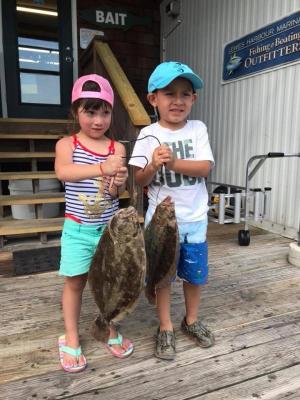When planning a fishing trip, one of the most important factors will be the weather for the area you want to fish. If you only use the information from the blow-dry weather guy on TV, you could wind up with a nasty surprise once you get out on the water. It is critical to use several weather sources before deciding where or when to go.
I don’t know where the local TV stations get their marine weather, but I only use NOAA weather reports, and they are often in conflict with what I see on TV. Not too long ago, the TV had a report calling for winds 15 to 20 knots northwest on Delaware Bay with seas of 2 to 3 feet. I would love to take the person who put that on the air out in those 2- to 3-footers and watch his eyes bug out when the waves start crashing over the bow. If there is one place I don’t want to be, it’s Delaware Bay when the wind is out of the northwest.
Another thing you won’t see or hear on regular weather reports is the number of biting bugs that invade the beach in the summer when the wind is out of the west. It is not only the beach that gets covered up; I have had flies attack in swarms while trolling the canyons 60 miles or more from the beach.
No one is more aware of the failings of NOAA weather than when they give out warnings of problems that never happen or beautiful forecasts that turn ugly once you are on the water. For this reason, you must be your own weather person and use what may be called local knowledge to make your own forecast.
As an example, I think of the aforementioned northwest wind on Delaware Bay. I recall a trip planned for Delaware Bay in my 16-foot tin boat one September morning. I launched from the Lewes ramp and when I tried to exit Roosevelt Inlet, I took a few waves over the bow. Once in the open bay, I ran behind the jetty, turned around and headed back to the ramp.
When the boat was on the trailer I headed to Indian River Inlet, launched and ran out of the inlet to the Croaker Canyon about a mile or two off the old Coast Guard Station. The seas were manageable and we caught enough trout and croaker to make a good day. My local knowledge told me while Delaware Bay was too rough on a northwest blow, the ocean close to the beach would be just fine.
Another bit of local knowledge is how strong the wind blows in the afternoon on hot summer days. I have fished the canyons in perfect weather conditions only to have a very unpleasant ride for the last 10 miles or so back to the dock.
This happens because the temperature on land heats up way past the temperature of the water. The difference in temperature between land and water creates a difference in barometric pressure, and that causes the wind to blow.
There is little anyone can do when running offshore to avoid this problem. The travel time to the canyons is going to take two or three hours each way, and you would have very little fishing time if you headed back home around 10 a.m. to avoid the rough seas close to the beach.
You can avoid the afternoon winds when fishing Reef Site 11, the Old Grounds or the Del-Jersey-Land Reef by leaving the dock at or before sunrise and heading back no later than 2 p.m. You also avoid any pop-up thunderstorms that happen in the afternoon.
The direction of the current is another thing you have to factor in to any weather report. In the ocean, the current runs north on incoming water and south on the outgoing. A south wind will kick up higher seas on the outgoing and add to your drift speed on the incoming.
So the next time the weather guy says tomorrow will be a beautiful day with a refreshing northwest breeze, you know not to plan a trip on Delaware Bay.
Fishing report
Flounder fishing is steady in the Lewes-Rehoboth Canal, Delaware Bay and the inshore ocean with a good day average of one to two keepers per person. Six-inch Gulp! swim shads or twister tails in nuclear chicken and live minnows have been the top producers.
More croaker and spot have been caught off the fishing pier at Cape Henlopen State Park on bloodworms. A few keeper flounder have been caught here on live minnows rigged Carolina style.
Indian River Inlet continues to give up croakers on FishBites or sand fleas. The area along the rail at the southside campground has been the top location.






















































